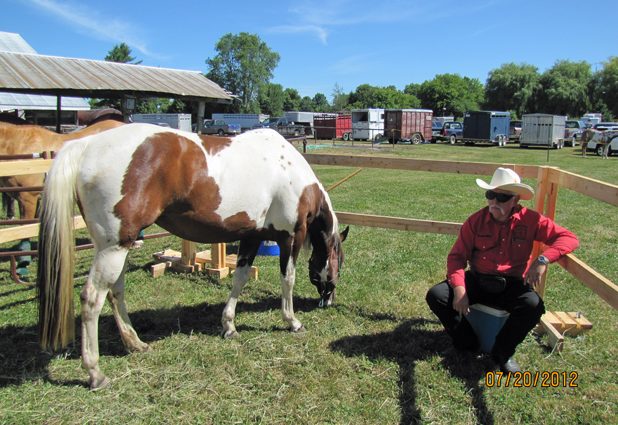 CFN – This Column of “Spirits in Unity” is being published by CFN for the community of Stormont, Dundas & Glengarry. It is an honour to have you as a reader. I welcome any comments, questions or topics you would like me to discuss. I hope you enjoy reading about the wonderful world of horses and the impact that natural horsemanship can have in making it a better world for both horses and humans.
CFN – This Column of “Spirits in Unity” is being published by CFN for the community of Stormont, Dundas & Glengarry. It is an honour to have you as a reader. I welcome any comments, questions or topics you would like me to discuss. I hope you enjoy reading about the wonderful world of horses and the impact that natural horsemanship can have in making it a better world for both horses and humans.
In one of my previous columns I used the quote, “Don’t just do something, stand there” and sure enough someone pointed out to me my typing error and that the correct saying was ‘Don’t just stand there, do something’. Of course they were right, except in horse Ville.
You see in horse Ville things are often the opposite of what they are in human ville. That is why one of the most effective techniques in dealing with horses is reverse psychology.
When dealing with horses it is often best not to do the first thing that comes into your mind, but the exact opposite of what you thought was right. That’s because you are dealing with a prey animal and he thinks differently than predators. They think laterally.
Lateral Thinking
Lateral thinking means thinking around a problem or as some say, ‘Outside the box’. Reverse psychology and lateral thinking help you act more like a prey animal and less like a predator.
Horses are very good lateral thinkers. Predators are straight line thinkers. Predators go directly to the problem which is what make them so predictable to horses. Horses seem to know what happens before what happens, happens.
When you use direct line thinking with horses, they tend to do just the opposite of what you want.
Using Lateral Thinking
Let’s say you place a Frisbee on the ground and you want to get your horse to go over and put his foot on it. Most people, go directly at it and their horse immediately tries to avoid it. But if you start playing a game around it, such as circling, or spiralling in to it, your horse will begin to feel that it is more like a game (play) and try to step on it. As soon as he does, “Don’t just do something, stand there”, relax. Your horse will soon begin to feel smarter and calmer as a result.
Reverse Psychology
Have you ever tried to catch a horse in a herd of horses in a large field and had them just run away from you? Unless you really want the exercise of playing the catching game with him, try to think outside the box and use reverse psychology by just sitting or laying down in the grass and doing nothing. Often his natural curiosity will get the better of him and he simply won’t be able to resist investigating. When he comes give him a treat, rub him for awhile before throwing that rope on him. Or if you really want to ‘blow his mind’, just leave. The next time you come to get him he will be looking at you in an entirely different light.
It is very hard to get humans to get it through their heads to do the opposite of what they want. If you want to deal with horses effectively, it is exactly what you must learn to do. Retreating builds confidence and curiosity in horses, improves your trust/bond relationship and helps to develop a better partnership.
In our ‘Spirits in Unity’ program we believe in developing a trusting relationship with a horse before even thinking about getting on his back. He probably prefers it that way too.
If you are interested in learning about our Spirits in Unity Tour for 2012 or what other people interested in horse welfare are doing with natural horsemanship in our area you can become a member of The Eastern Ontario Natural Horsemanship Club at www.meetup.com .There is no charge to join.
Whether you are just a horse lover, have dreams of owning a horse someday, or already have one, I hope these columns will give you some insight into the true nature of these magnificent creatures. I hope you will find them both informative and inspirational.
May all your dreams come true,
Garry “Horsetalker” Meek

